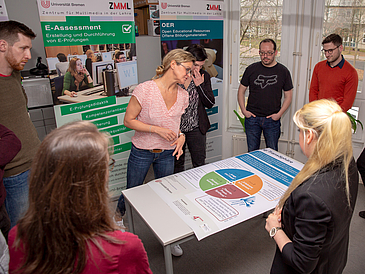Breaking new ground in digital teaching and learning together: this is the focus of the five projects that have been funded since the beginning of this year as part of the Quality Pact Teaching federal program at the University of Bremen. The focus here is on making student learning more flexible and teaching more multifaceted. Some of the formats create what are known as open educational resources (OER); i.e., educational materials accessible to the general public free of charge. Such concepts have the potential to promote the internationality of teaching while providing quality education for all people and facilitating lifelong learning.
Especially in the context of the internationalization of universities, digital teaching and learning materials are becoming increasingly important. Professor Thomas Hoffmeister, Vice President Academic at the University of Bremen, describes his vision of future digital teaching and learning scenarios: “To develop innovative didactic concepts for teaching in European university networks, we want to break new ground in how students learn. It is important for us to promote the development and use of freely available digital educational content and to link it with research-based learning in projects. Digital elements in teaching and learning are a great challenge and at the same time an opportunity for making course offerings international and flexible.”
Five New Projects Have Been Launched
Innovative, digitally supported forms of teaching and learning are used in fields as diverse as law, business studies and economics, education, and teacher education. Here, traditional forms of teaching are supplemented or replaced by innovative elements. In such blended learning formats, on- and off-line phases are linked together in a meaningful way so that, for example, students can access the teaching materials online and deepen their acquired knowledge of case studies in classroom instruction. Videos are used in a number of different ways in the funded projects: with expert interviews as open educational resources for teacher-training students, as learning videos created by students themselves, or as video tutorials that support methodological training. A common aspect of all these approaches is that they give students a more active role in their learning process, and they improve acquisition of competences.
Intensive Support by ZMML
The participating teachers are supported by the Zentrum für Multimedia in der Lehre (center for multimedia in teaching – ZMML) team. ZMML is the central e-learning institution of the University of Bremen and aims to introduce and further develop e-learning services in a needs-oriented way and to bundle all e-learning activities and innovations at the University of Bremen.
Additional Information:
www.uni-bremen.de/zmml/projekte/forsta-digital/ (German only)
www.uni-bremen.de/zmml/lehre-digital/open-educational-resources-oer/ (German only)
Contact:
Stefanie Wiechers
Project coordination ForstA digital
Zentrum für Multimedia in der Lehre (center for multimedia in teaching – ZMML)
University of Bremen
Tel.: +49 421 218-61434
E-mail: forsta-digitalprotect me ?!uni-bremenprotect me ?!.de

